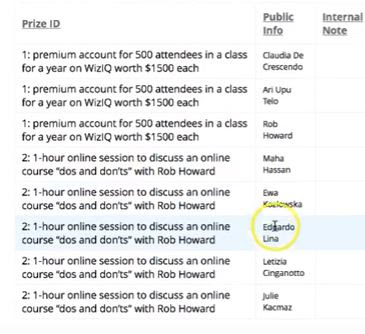Mi piace insegnare e ho la fortuna di farlo da sempre ai miei studenti e da alcuni anni ai colleghi docenti. Mi interessa tutto quello che riguarda l'insegnamento blended o totally online. Studio e approfondisco queste modalità didattiche in autonomia. Dai miei studi ho intenzione di scrivere un opuscolo per i docenti, da pari a pari.
Elenco blog personale
mercoledì 22 giugno 2016
lunedì 13 giugno 2016
Final Thoughts on Open eTwinning
What have you learnt from the course?
This course taught me the value of collaborative and cooperative work. It's not an easy achievable goal, but a responsable teacher must be able to take up the challenge.
And so I adopt the suggestion that
"COMING TOGETHER IS A BEGINNING,KEEPING TOGETHER IS PROGRESS,WORKING TOGETHER IS SUCCESS"
Henry Ford
I took part in many MOOC and I can say that this course has its positive aspects such as moderators (Cristina, Yolanda and Diego), methodology, collaboration, as well as materials.
In particular I have appreciated P2P activity, a real opportunity of professional growth.
It is really about identity, diversity, cultural confrontation, in the best sense of the word.
What are the negative aspects of the MOOC?
I strain to see negative aspects, really!
What would you suggest to improve it?
I would like to suggest to carry on like this in the future, keeping up the pressure on this issue in an eTwinning group on platform.
domenica 12 giugno 2016
My final work
I have learnt a lot by moderators and all colleagues involved in the course.
And so this is my final work.
venerdì 10 giugno 2016
My P2P activity for week 4 in Open eTwinning course.
In week four we have
to design an activity following these
three criteria:
Ø
Collaboration
Ø
Concrete final
product
Ø
Relation to the
objectives of the project draft in the previous module
So I introduce
an activity to develop at the beginning of the project, in particular in the
first of work phases, in which students of different ages and from different
countries know themselves. It’s a way of breaking the ice and creating the
right spirit of collaboration and cooperation.
Each student is
invited to present himself/herself by a collage with few images that represent
who they are, what they believe in, something about their personality and
talents.
They are
invited also to upload their collages into a Padlet, just as it you can see
below.
Finally they
have to go to a dedicate forum and comment at least two of their partners’
collages, finding some inspiration in a toolbox (in particular adjectives to
describe personality) built collaboratively by students and teachers as a wiki and available in the twinspace.
Elder students realize
tutorials to teach younger students to use simple tools to collect photos
(Kizoa, but also PhotoPeach, Pizap, Pickmonkey, Befunkly…).
The project I'm designing begins here and it's a project of digital storytelling; it continues in other phases and expect the realization of an e-book and some customazed novels by Storyboardthat collaboratively created by all students involved.
The project I'm designing begins here and it's a project of digital storytelling; it continues in other phases and expect the realization of an e-book and some customazed novels by Storyboardthat collaboratively created by all students involved.
sabato 4 giugno 2016
venerdì 3 giugno 2016
Peer assessment activity on draft of collaborative project: some reflections
In this activity of P2P assessment I
have found more useful the suggests of my colleagues.
I think it’s positive when some tips
are given sincerely and it is therefore
important that we are not disappointed for this. Especially considering that in
this week we must produce only a draft of our projects, and so necessarily to
review.
It
seems that my project should be strengthened in the part of evaluation. In fact
in my project’s draft outcomes are described but there is
no indication of how the outcomes will be assessed and evaluated. Effectively
I thought I would come back to evaluation at a later stage.
It is important, by contrast, that
an evaluation plan is identified during the planning phase of the proposal and
not added to the proposal as an after-thought, given that it identifies the
assessments and the formative and summative evaluations that are germane to the
key evaluative components of the project. And so I’m reflecting on a rubric that
takes into account:
Ø
Pedagogical
innovation and creativity
Ø
Curricular
integration
Ø
Collaboration
among partners schools
Ø
Use
of technology
Ø
Continuity
Ø
Results
and benefits
I think also that evaluation is
necessary as for students as for teachers. To that end, it could therefore be
established to create some visitors (other teachers or students’ parents).
In addition, I myself think that I
must add some other aspects not adequately considered up to now, for example
something about the use of different languages and the choice of partners schools.
giovedì 2 giugno 2016
Iscriviti a:
Commenti (Atom)


